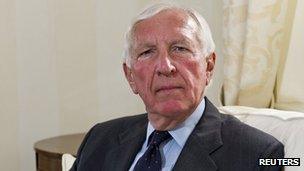Antony Jenkins: The challenges facing Barclays' new boss
- Published
The appointment of Antony Jenkins as the new chief executive of Barclays is the start of a new chapter at the UK bank.
The previous chief executive, Bob Diamond, and chairman Marcus Agius both announced their departures earlier this summer after the Libor rate-rigging scandal.
Mr Agius has already been replaced by Sir David Walker, a respected banker who led the 2009 government inquiry into the rules governing how banks are run.
Sir David said previously that he was looking for a "polymath" to replace Mr Diamond.
It appears he has found his man.
Lifelong banker
Mr Jenkins has a Masters in Philosophy, Politics and Economics at Oxford University and an MBA from the Cranfield Institute of Technology.
He started at the bank in 1983 on the Barclays Management Development Programme before going on to hold various roles in retail and corporate banking.
In 1989, he moved to Citibank, based in both London and New York. And he was on the board of Visa Europe until last year.
Mr Jenkins returned to his first home, becoming the head of Barclaycard from 2006 to 2009, and has been fast-tracked ever since.
Following his stint running the credit card business, he has been on the equivalent of the bank's politburo since 2009, helping to take some of the big decisions at the top of the bank.

Sir David and Mr Jenkins will have to work together to restore Barclays reputation
In an interview with the BBC's Radio 4 in 2009, he spoke of his approach to get himself prepared for high-pressure situations.
"If I've got a big meeting to get pumped up for, I'll put on some rock music," Mr Jenkins said.
"If I need to settle down and think through a difficult problem, I'll put on something calming. Maybe jazz or a bit of classical music."
In this he shares something in common with his chairman, Sir David, whose outside interests are listed in Who's Who as music and long-distance walking.
With the current state of Barclays, there may be a lot of loud music coming from the corner offices of the headquarters in Canary Wharf.
I-banking
In his new role running one of the UK's biggest banks, Mr Jenkins will face several challenges.
Mr Jenkins was the head of retail banking. His predecessor Mr Diamond took over as Barclays chief executive in September 2010 having previously headed the bank's investment banking arm, Barclays Capital.
"I-banking" is the main revenue driver at the bank. During the first six months of 2012, the investment bank made a profit of £2.27bn, external - more than half of Barclays' total profit.
Mr Jenkins' division, retail banking, made a profit of £1.68bn.
So the new boss will have to get to grips with a bank that makes most of its money in areas such as derivatives and sovereign debt, that may be unfamiliar to him.
Mr Jenkins will also have to deal with the thorny issue of executive compensation.
In 2011, Mr Diamond earned £20.9m, comprising salary, bonuses and share options, and he is reported to have a personal wealth of £105m - all of which came under fire from politicians.
Mr Jenkins will be paid £1.1m, which may be relatively more palatable to the rank and file.
(That said, he is eligible for a potential annual bonus worth up to 250% of his salary and could get a long-term incentive bonus worth a maximum of 400% of his pay.)
Restoring reputation
Reform of Barclays' investment banking division is what Mr Jenkins will have probably have to deal with first and foremost.
The division has been associated by investigators with the offences that led to Barclays' £290m fine for attempting to rig the Libor inter-bank lending rate.
But there are also other matters to deal with. It was revealed on Wednesday that the UK's Serious Fraud Office had started an investigation into payments between the bank and Qatar.
The inquiry relates to 2008 when Barclays was raising money from Middle East investors during the banking crisis.
Barclays has also been caught up in another investigation, relating to the mis-selling of complex financial products - interest rate swaps - to small UK businesses.
Some of these scandals are industry-wide.
But Mr Jenkins will have to work hard to restore the reputation of the bank, while also maintaining the profits of the investment bank.
"We have made serious mistakes in recent years and clearly failed to keep pace with our stakeholders' expectations," he said.
Time will tell how he resolves that question.